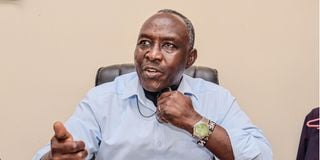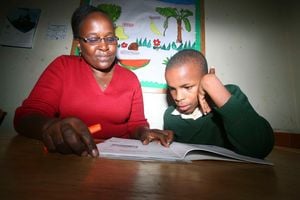
As you enter the gates of this church in Ruiru on a Sunday around 11 am, praises rent the air. It would have been a common scene replicated in many churches across Kenya as the man of the cloth, Duncan Mbogo, walks to the pulpit. But it isn't.
The congregation is attentive, perhaps keener than normal, as Bishop Mbogo greets them and says a prayer. Around his waist, his amplifier is seated on his right side.
A microphone that runs from the right ear, rests close to his mouth and is connected to the amplifier. On his right hand, and as he speaks, he presses a small gadget (electrolarynx, which is a battery-operated machine that produces sound to create a voice) that is hung on his neck.
At the age of 42, Bishop Mbogo battled persistent voice hoarseness that made him swallow numerous anti-allergic cold/flu medicines. Tired of taking medicines with no change, he sought help from an ear, nose and throat (ENT) consultant who after several biopsies told him that both his vocal cords had been affected by throat cancer.
With only six months to choose from since the cancer had spread like wildfire, Bishop Mbogo went through an eight-hour-long operation to have his vocal cords completely removed (laryngectomy) in 1994.
Now 30 years later, and at the age of 72, his demeanour only embodies hope, and resilience that even in the face of challenges, you can rise again and keep on doing what sets your heart on fire.
How did you take the cancer news?
When I was told I had cancer of the throat, I was anxious, nervous... I did not know what to do. The first scare was the loss of my voice because that is what I use as my tool as a teacher, pastor, and public speaker. Losing my voice was like losing power. It was like death to me. That is what scared me.
Apart from how you speak, are there changes you experienced after the surgery?
Yes. I can't shout like before. I can't talk and eat at the same time. I can't easily swim unless I use special assistive devices available in some countries like the US. These are just minor things that affect my life.
Did you have moments where you questioned God?
I had so many questions; why me? why this time? Some believers would say, ' I wish it was me, not you pastor... I wish it was me then I would say why me?' I remember one time when I was asked that question, God spoke to me and said 'I do not answer to those questions.' He wants me to wait and see what is coming out of it. Today, I'm glad I waited.
How so?
One thing I realised later on is that God has given me a different heart. Before me, there were one or two people who were laryngectomees [a person whose voice box has been removed] but they were not known.
When God chose me, I decided to go public about laryngectomy. I went to different hospitals and got to know who are laryngectomees.
So, I identify myself with them today. Some would not have been encouraged without seeing someone like me. One of them said, 'If it were not for you, I would not be encouraged'. That encourages me.
You preached that when in crisis there will be two prophets; a good and a bad one. Did you encounter them?
One of my good prophets was my late wife. One day in a church service, she said, 'Church I would like to ask you. How many believe my husband will speak again?' Nobody shot his/her hand high up, only mid-air.
But my wife said, 'I declare! Hallelujah! I declare that my husband will preach again.'
About the bad prophets, some suggested that I should retire and go to the Head Office while others said I should just sit behind a computer and not preach or speak in public.
But, the leadership of CCI [Christian Church International] believed in me, and so they did not delegate my duties.
Also, I wanted a place where I could be a low profile like guidance, counselling and teaching and they facilitated that.
Was the society receptive of you?
Not really…I remember one time I went to the bank and when I started speaking, I was seen like a robot and so everybody was scared. I would look awkward, funny, like a misfit in the society.
Another incident that was humorous to me was when I went to a counter in one shop and upon removing my electrolarynx to speak, the lady immediately ran away to hide.
I was left with all my money at the counter until a few minutes later when she slowly reappeared.
I found out that the reason she had disappeared was because she thought my electrolarynx was a short gun or pistol.
How do you deal with discrimination because of how you speak?
It is very common particularly when I meet people or even speak to them over the phone. First of all, they tell me to change your speaker, or your phone has got a problem.
But I know at the back of their minds they do not intend any ill, so I go slowly and open up and tell them why I speaking the way I do, that it's because I'm using a machine because I lost my voice box to cancer. When I mention that, they are quick to listen and we communicate.

What keeps you going?
I derive a lot of encouragement from prayers. I believe every human being has the desire to know God in his heart. Thank God I am a believer and prayer has made me who I am. Believing in God and having confidence in Him has made me different from the others.
Also, I get so much joy and satisfaction when I meet the laryngectomee patients. My passion is counselling them and their relatives about the changes that will come as well as informing them about the dos and don'ts.
Which are?
For the dos; understand their need to express their feelings, be patient, encourage them, allow them to speak for themselves, express interest as they speak, remind them to speak slowly, help them remain active with their friends and associates and consult their doctor regarding any problems.
Do not overprotect them, say words for them, encourage whispering, allow them to feel sorry for themselves and do things for them if they can do.
You've been serving as the National Chairman of the Kenya Association of Laryngectomees since 1997, what pushes you to continue impacting lives?
What strengthens my faith in particular is when I see somebody who is at the point of death and when I share with them, they say I thank God you came. I thank you that you are here.
For instance, there was a young man, if I remember well, it must be in 2009, and this young man had refused surgery. Then the doctor decided to call me so when I started speaking to him, he said, 'Now I will be operated on.' That young man is very strong.
Also, when people travel from various parts of Kenya such as Malindi, Mombasa, Kisumu, Nairobi, and Kakamega, looking for me, to discuss laryngectomy, it means that I have some impact on their lives.
After my surgery, I came across a friend who gifted me this kind of machine (an electrolarynx). When I used it, I produced a voice. So, I learnt how to best use the machine so that when I was feeling lonely, cut out…now I can communicate with everyone in society.
Given the chance to address all laryngectomees, what message would you want them to take to their hearts?
It is that there is hope and I will echo what one of them told me. 'Now I believe there is hope because if you can speak the way you are speaking, if I can see your confidence then I know there is hope!' It's about teaching with examples, not theories. I was here where you were in bed but now, I'm standing. I have tested this and I know it works. Some call me after recovery and say they want to meet me so that I can tell them more of that hope and joy.
Are there words that you still face difficulty in pronouncing as a result?
I went to training in seminars and I was told that as a laryngectomee there are some words like syllables that will be difficult to pronounce. For instance, you may say 'e' but you may not be able to pronounce 'he.' So, sometimes you may speak and people wonder what you are talking about because you are not able to pronounce the words as they are supposed to.
What then happens when the electrolarynx is spoilt or the battery dies? How do you communicate?
There is what we call oesophageal speech, which is when you swallow the air and then speak. There is silent articulation or if you like, whispering. You can also do the paper and pen writing. There is what we call a prosthesis, a tube that is put in the stoma, a hole in the neck.
You may find people maybe in other places who close the stoma by blocking it with their fingers and releasing the air from the lungs to the mouth. We don't breathe through the nose. We don't breathe through the mouth. We breathe through the neck.








